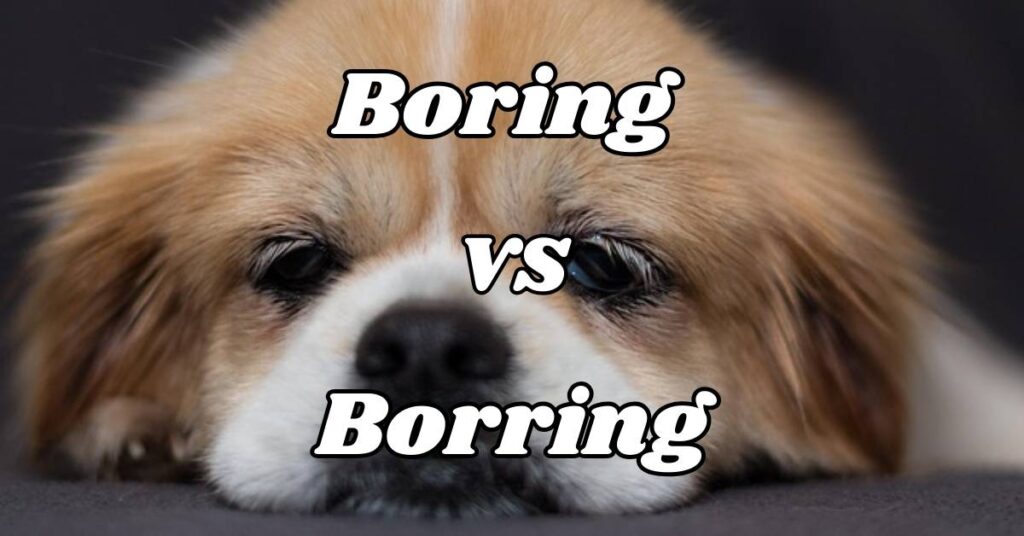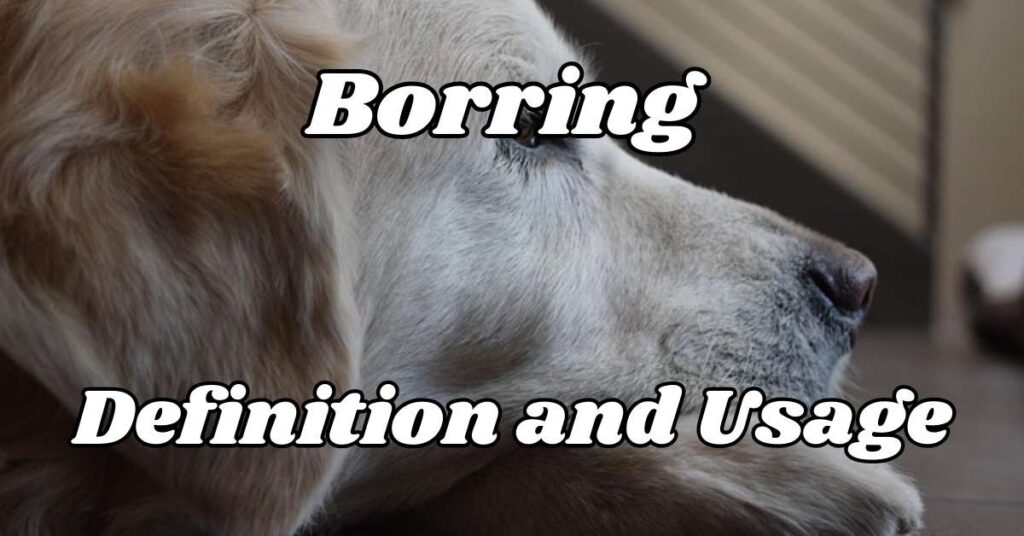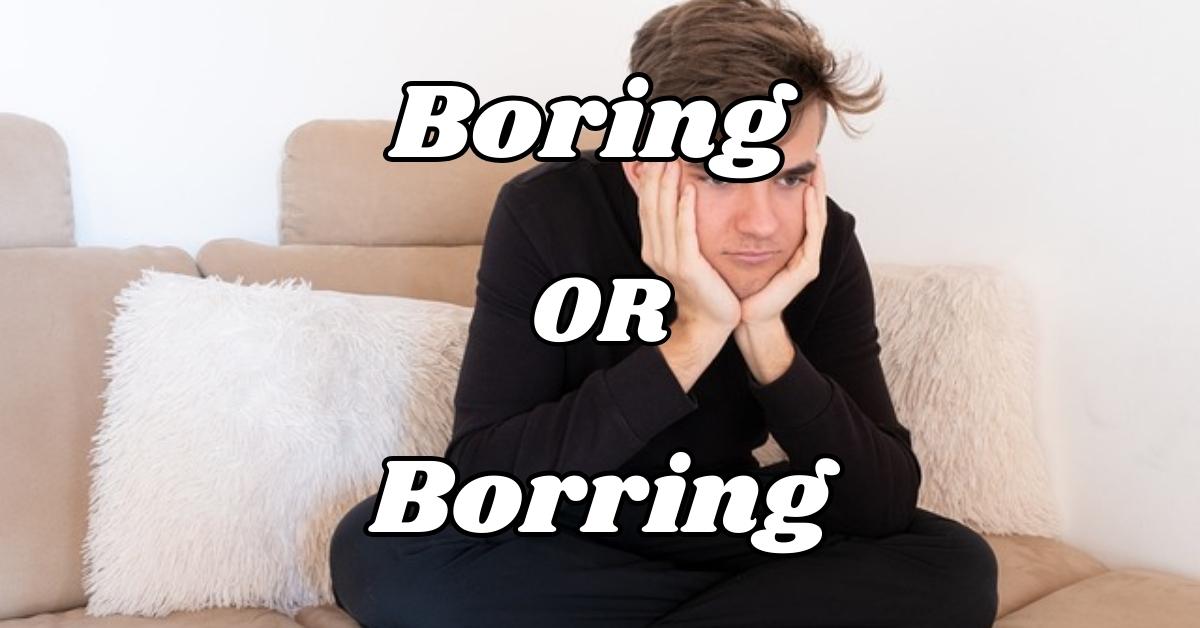Boring or Borring: Ever grapple with choosing between “bored” and “boring“? Or stumble upon “borring” and wonder if you’ve missed a memo? You’re not alone. Mastering this distinction elevates your English skills, and this guide is here to help.
We’ll delve into definitions, dissect usage, and spotlight common mistakes. Think of “bored” as describing how someone feels, while “boring” describes the thing that causes mental weariness that feeling. We’ll also clarify why “borring” is a misspelling to avoid.
By the end, you’ll wield these words confidently, enhancing your language precision. Let’s decode the subtleties of “Boring vs Borring” so you can feel confident in your word choices.
Quick Summary
The English language can be tricky, and sometimes, spelling variations lead to common mistakes. One such instance is the confusion between “boring” and “borring.” While “boring” is a widely accepted and frequently used word, “borring” is generally considered a misspelling.
Understanding this distinction is crucial for clear and effective communication. We will explore the correct usage, historical word origin, and practical examples to help you master this nuance.
Difference Between Boring vs Borring

The primary difference lies in their validity. “Boring” is an adjective that describes something uninteresting or monotonous, causing mental weariness. On the other hand, “borring” is almost always a misspelling.
While you might see it in informal contexts, it’s not recognized as a correct form in standard English. Recognizing this distinction is fundamental for effective written communication. It’s all about understanding spelling consistency in the language.
Origins of the Word Boring
The word “boring” has evolved. Initially, in the mid-15th century, it described the action of piercing. By 1840, “boring” acquired its modern sense, meaning something that causes ennui, weariness, or is annoyingly dull.
As Billy Childish and Charles Thomson noted, “boring” art lacks impact. It’s something whose presence or absence makes little difference, suggesting a lack of emotional or intellectual engagement.
Boring: Definition and Usage

“Boring” is an adjective describing something uninteresting or unexciting. It often precedes nouns or follows pronouns, like saying, “This meeting is boring,” or “He’s incredibly boring.”
Something boring can cause mental weariness, making people restless or disinterested. Using “boring” correctly conveys that something lacks the power to capture attention or generate enthusiasm, resulting in a feeling of monotony.
Boring Definition
“Boring” describes something that causes weariness due to a lack of interest or excitement. It conveys a lack of stimulation, often leading to a feeling of restlessness. A boring activity or person fails to capture attention or spark enthusiasm.
The term is frequently used to express dissatisfaction with monotonous or uneventful situations, making it a common descriptor in everyday conversation.
How to pronounce boring
The pronunciation of “boring” is straightforward: /ˈbɔːrɪŋ/. Stress the first syllable, “bore,” making it sound like “BORE-ing.” Proper pronunciation ensures clear communication and prevents misunderstandings.
You can find audio examples in reliable dictionaries like the Oxford English Dictionary. Mastering the pronunciation of “boring” helps you confidently incorporate it into your everyday conversations.
Uses of Boring in a Sentence
Here are a few examples demonstrating the correct use of “boring” in a sentence:
- “The lecture on Text analysis was incredibly boring.”
- “I find doing laundry quite boring.”
- “The movie was so boring that I almost fell asleep.”
- “His sentiment analysis felt boring after the second hour.”
- “Attending the same meetings every week can be quite boring.”
Synonyms of Boring
Here are a few synonyms you can use instead of “boring” to add variety to your vocabulary:
- Dull
- Tedious
- Monotonous
- Uninteresting
- Humdrum
- Tiresome
- Mind-numbing
- Insipid
- Dreary
- Prosaic
Borring: Definition and Usage

“Borring” is not a recognized word in standard English. It’s simply a misspelling of “boring.” Therefore, “borring” has no accepted definition or proper usage. Confusing “boring” with “borring” can detract from your message’s credibility.
Always double-check your spelling to maintain clear and professional communication. Stick to “boring” when describing something uninteresting.
Borring Definition
As “borring” is a misspelling, it lacks an official definition. It does not appear in standard dictionaries or language resources. Any attempt to define “borring” would be incorrect, as it is not a recognized word.
Always use the correct spelling, “boring,” when you want to describe something that lacks interest or causes mental weariness.
Borring Usage
You might encounter “borring” in informal settings, such as social media posts, text messages, or handwritten notes. However, in formal writing or professional communication, it should always be corrected to “boring.” Always double-check your spelling conventions!
Side by Side Comparison
Let’s put these terms side by side to highlight the key differences:
| Feature | Boring | Borring |
| Definition | Causing boredom or lacking interest | Misspelling of “boring” |
| Part of Speech | Adjective | N/A |
| Correctness | Correct | Incorrect |
| Usage | Formal and informal writing | Informal contexts (often unintentional) |
| Example | “The class was incredibly boring.” | “The class was incredibly borring.” (Incorrect) |
Everyday Usage Examples
Understanding how “bored” and “boring” function in everyday conversations cements your grasp of their correct usage. For example, saying “I am bored” expresses your feelings, while “This book is boring” describes the book’s quality.
These everyday examples highlight the distinction: people feel bored, and things are boring. Practice using these words in context to reinforce your understanding.
Examples of Boring in Context

- “The parsing felt boring after 2 hours.”
- “I find paperwork incredibly boring, especially after lunch.”
- “The presentation was so boring that half the audience was on their phones.”
- “Sitting through traffic is the most boring part of my day.”
- “The museum exhibit was surprisingly boring; I expected more.”
Examples of Borring in Context
While “borring” isn’t correct, here are examples of where you might see it (incorrectly):
- “This game is so borring!” (Should be “boring”)
- “I had a borring day at work.” (Should be “boring”)
- “Don’t you think this movie is borring?” (Should be “boring”)
- “My teacher is so borring, I can’t concentrate!” (Should be “boring”)
- “That book was incredibly borring.” (Should be “boring”)
Common Mistakes
The most common mistake is simply misspelling “boring” as “borring.” This often happens due to rushing or not paying close attention to spelling. Another mistake is using “borring” in formal contexts, which can undermine your credibility.
People might also feel the same way from the finishing of the context.
Tips to Avoid the Mistakes
- Proofread: Always double-check your writing for spelling errors.
- Use Spell Check: Utilize the built-in spell check features in your word processor or online tools.
- Read Aloud: Reading your writing aloud can help you catch errors you might otherwise miss.
- Memorize the Spelling: Make a mental note of the correct spelling: B-O-R-I-N-G.
- Practice: The more you write and pay attention to spelling, the better you’ll become at avoiding these mistakes.
Tips to Remember the Differences
- Associate with “Bore“: Remember that “boring” comes from the verb “to bore.”
- Think of “Ring”: Notice that “borring” has an extra “r,” which is incorrect.
- Use a Mnemonic: Create a memorable phrase like “Boring Only Requires One R.”
- Visualize the Word: Picture the correct spelling of “boring” in your mind.
- Analyze Syntax: By analyzing syntax, you should be able to see if it’s correct.
More Article: Beggar or Begger: What’s the Difference?
FAQS: Boring or Borring
Is it Boring or Borring?
The correct term is “boring,” as “borring” is a misspelling and not recognized in standard English.
Is Borring grammatically correct?
No, “borring” is not grammatically correct; it is simply a misspelling of the word “boring.”
What is the meaning of Boring?
“Boring” describes something that causes weariness or a lack of interest, making it unexciting or dull.
How do you spell boring a hole?
When referring to creating a hole, you spell it as “boring,” as in “boring a hole.”
Conclusion
Understanding the difference between Boring or Borring is essential for effective communication. Remember that “bored” reflects a person’s feelings, while “boring” describes something that causes mental weariness.
Avoid the common pitfall of using “borring,” as it is simply a misspelling. By mastering these distinctions, you enhance your language skills and ensure clarity in your writing and speech.
With this knowledge, you can confidently navigate conversations and texts, making your communication more engaging and precise. Embrace these insights and say goodbye to confusion.
Related Post: Togather or Together: What’s the Difference?

